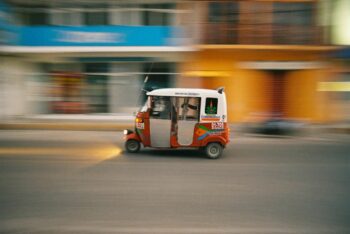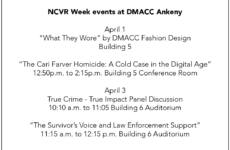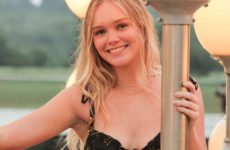
Anthony Arroyo
Note: This interview has been edited for length and clarity.
You can find a podcast of this interview here.
Former Campus Chronicle photographer Anthony Arroyo graduated from Drake with a Digital Media Production degree. Originally from Des Moines, he’s been a portrait photographer, commercial photographer for brands like Raygun, and has done freelance work for Drake. He also made portraits for Grammy President of the Midwest and Grammy nominee artist J Ivy.
He currently works for Mittera, doing commercial photography for grocery stores like Hy-Vee and Schnucks, as well as the National Pork Board.
You actually attended DMACC, so could you tell me a little about how DMACC prepared you for Drake?
I played football in high school and had a full ride to multiple schools. I decided to stay here in Des Moines and go to Grandview. I did fall camp, and I hated it. I knew I liked football, but I didn’t love it. So, when I got there, I realized this was not what I wanted to do for four years.
So, two weeks later, I decided to quit. Two days before the semester started at DMACC, I showed up, picked my classes, and I was going to school. At DMACC, I had no idea how nice the Ankeny campus was or anything. I showed up and I was pleasantly surprised. A lot of other surprises were how suburban it was. A lot of the time, I’m the only person of color in the classroom. So, the next semester, I would take some classes at the Urban campus that made me feel much better.
I remember that in my first year, I had no idea what I wanted to do with my life. However, I thought, “I’m at school and doing something.” That first semester was cool. I joined the Campus Cwhronicle, which gave me some stability. I bought my first camera at that point. I was using my iPhone for everything. That’s when I got a job in the marketing department at DMACC too early. They shouldn’t have hired me. I was 18, and I barely even knew how to use this camera.
You were so good at that’s why they hired you right?
I don’t know. I was prepared for the interview, and they’re like, “Yo, this kid is passionate. Somebody just hire him.” I made so many mistakes, and they couldn’t keep having me make those mistakes. I was hired in October 2017, and they fired me in March or April 2018.
What was being fired like?
They called me and said, “Yo, you messed up on this thing?” Looking back, they were hiding things that I messed up on but didn’t tell me. It built up, and they said we have to find someone else who knows what they’re dealing with. I understood I didn’t know what I was doing. I’m just glad young people experience failure. Especially in that way. At the end of the day, who cares?
That first year was just a lot of learning. I have changed a lot about who I am now because I left that identity as an athlete. Am I a journalist? Am I a photographer? Am I both? What do I want to do?
So, going into my second year of college that summer, I was like, I’m going to learn everything I can and get good. That’s what happened; a huge, exponential growth occurred that summer. I just dove into YouTube videos and started taking a photography class.
In that second year, I finally took a class, and it was studio photography. I learned about lights, and honestly, that class has changed my life. I wouldn’t have the jobs that I’ve gotten in the last six years, and I wouldn’t be in this studio, Mainframe Studios.
I graduated from DMACC. Two months later, I got a commercial photography job at Raygun. Should I go to Drake? Why not go to Drake? That’s where I made decisions.
What are the good things that happened there? How does it compare to DMACC?
That first semester at Drake was just a lot of growing pains. The workload was a lot different than DMACC. There is much more material to go through than at DMACC. I had to get better at studying. Luckily, I had a really good advisor. I appreciate that about Drake. My advisor at Drake, Chris Snider, was amazing. I knew him when I was in high school.
What I loved about Drake’s first semester before COVID happened was in a group called La Fuerza Latina. We can discuss my upbringing in my projects, but I’m Mexican American. Growing up, my parents kept me away from certain family members because they were up to no good. They isolated us, and it was for the best. Honestly, they did that with good intentions when I think about it in hindsight.
I think about the good and bad aspects of that decision. I go back and think, this situation happened because I wasn’t around these kinds of people. Now that I’m older, when I went to Drake, I told myself I wanted to make sure I hung out with people who looked like me, making my experience much more diverse. Drake in itself is not diverse, but the people I chose to be around were. We all struggled because there were few of us on campus, so we should be around each other. So that was really nice, too.
I had a conversation with someone who once ran Crew Scholar, and he said to me, “Anthony, you need to understand you’re a rare breed on campus. You’re a Latino, and you’re a male. Think about all the other male Latinos on this campus. There are about three other ones. Just know, if you need help, you can reach out.”
He then told me that transfer students, especially transfer students of color, tend to work on campus, and you go to classes, and that’s it. So he told me that when I first got to Drake, I tried to be involved as much as possible because I was working a lot of freelancing, Ray Gun, and the marketing department at Drake. So I was doing a lot already. I ended up being on the executive board for La Fuerza Latina and doing Drake Mag, too. So I was just being super involved until then a pandemic happened.

Photo by Anthony Arroyo
You have a project on your website called The Home I Never Knew. Can you give us details on that?
The project, “The Home I Never Knew”, was when I went to Oaxaca, Mexico, for the first time in twenty years, from December 2020 to January 2021. And it was the first time I met my aunt. My grandma has come up, so I met her a few times here in the States, but I’ve never been down to the ranch that my dad grew up on. So it was just me taking photos.
I had no intentions of making a book, it was all shot on film. We went because it was my aunt’s wedding. So that’s the wedding you are talking about. I photographed the whole wedding, both digital and film, but it’s the film parts. I’m super Americanized. I’ve grown up until college. I felt so disconnected from my Mexican roots. So going there and how they accepted me was like, We love you. They brought me along for things and always kept me a part of all the activities. It was so nice to know that I have another place in this world that I can go to and be fully accepted. Yeah, it was great.

Photo by Anthony Arroyo
I noticed some type of isolation—I don’t know if isolation is the right word—but there’s a oneness like there’s always a focal point of something in all your photos.
I like to call them liminal spaces. You look at something, and you really feel the world within that frame. There’s so much happening in some of these, and some of them are a lot calmer. You look at a couple of subjects or a singular one. Honestly, it’s probably the best one I’ve taken in my life.
Any work you want to leave us with? What do you want everyone to know?
Take the risk now. Go fail. Do it. Don’t do anything if you’re not going to do it well. And if you start it, finish it. Ask for help. It’s so good to ask for help. That’s been one of the hardest things I’ve had to learn. It took me tearing my Achilles to get good at asking for help. You can change. I’ve changed three or four times at this point.
Do you like who you are now?
I love who I am, but I want to continue changing. I see other people stay the same for years. And I’m not even the same person I was this time last year. So, if you’re not evolving constantly, you’re doing something wrong. If you’re stuck, change, do something different. If you’re doing the same stuff and expecting change, that’s crazy. People will push their perspective of you onto you and will make it hard to change. I have to let that go, and it’s tough.
Other people expect certain things from you. When you stop doing those things that they expect, it confuses them. I’m really lucky that at eighteen, I quit football. It was the best thing I did for myself. I let down a lot of people, I guess. Looking back now, though, it’s super insignificant, like who cares if I played football or not?
All that matters is what I want, what you want. I’m going through a transition right now. This feels like a really different year, where a lot of things are going to change, and I’m going to get really uncomfortable. I’m not going to feel as safe as I’ve been feeling for the last two years. So yeah, go get it, get uncomfortable.





Comments